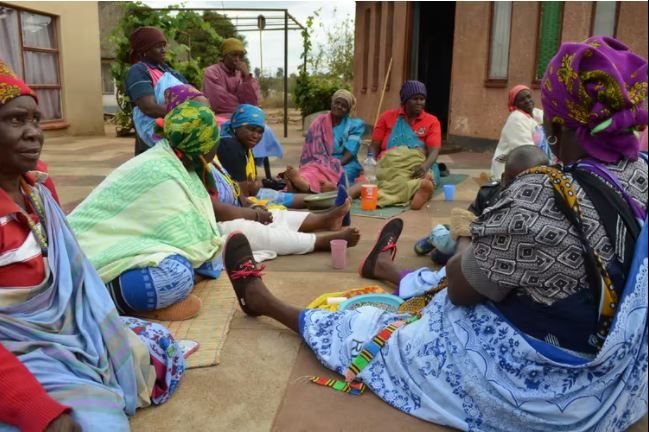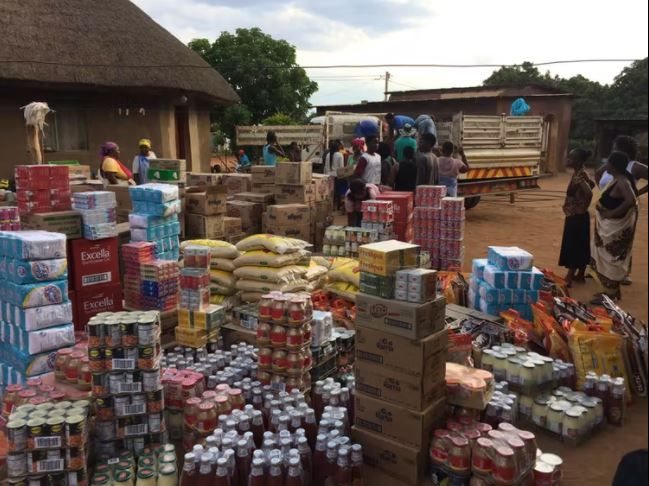Trending




 Sabre EMEA 2024 Awards: Razor PR, Retroviral top SA agenciesDanette Breitenbach
Sabre EMEA 2024 Awards: Razor PR, Retroviral top SA agenciesDanette Breitenbach
Elections 2024
Mutual aid in a global food crisis: Rural South African women work together

As the New York Times put it, for the global food supply “there are few worse countries to be in conflict than Russia and Ukraine.” Nearly 50 nations, many low-income and numerous in Africa, depend on these two countries for much of their wheat, as well as other grains and cooking oils.
For households chronically at risk of food insecurity, the Russian invasion is the latest in a long series of pressures.
The proportion of the global population at moderate or severe risk of hunger has been rising since 2015 as a result of the combined impacts of the climate crisis, conflict and more recently Covid-19.
The women I do research with in N'wamitwa, South Africa, have been staring down food crises and working to mitigate the effects for years. Many of these women are counted among “the poorest of the poor.” This means they live on less than US$1.90 a day (the World Bank’s money metric for extreme poverty) and fall below their country’s lowest poverty line, insufficient income to meet minimum food needs.
Despite being the "poorest of the poor", these women are not sitting on their hands waiting for assistance. Like resource-poor people all over the world, they are busy devising strategies and enacting tactics to meet the latest challenge of food shortages and surging prices.
Keeping households afloat
Thirty years ago, these women established a co-operative farm in the midst of a catastrophic regional drought — we made a film together about the ongoing value of Hleketani Community Garden to their households.
Irrigated by water-saving drip hoses, the garden provides nutritious, affordable produce year round. It was a lifeline for the village during South Africa’s strict pandemic lockdowns.
The pandemic "destroyed things at my home, my community, and my country. We could not visit our neighbours, could not check on our relatives," says founding farmer Josephine Mathebula. "The farm fed us."
Select scenes from the film ‘The Thinking Garden.'
Another crucial strategy these women pursue is savings clubs, known in South Africa as stokvels. As Caroline Shenaz Hossein, a global development and political science researcher, argues, these savings clubs are "at the very core of what we know as the solidarity social economy".
They are a key example of the diverse, ethical economic practices — including co-operatives and other forms of mutual aid — that help keep poor households and communities afloat.
South African stokvels are community generated, self-run savings clubs where members pay a monthly fixed sum and take turns collecting the funds accumulated. Clubs multiplied during the 1990s and 2000s, bolstered by growing confidence among Black and brown South Africans after achieving democracy, and in the face of urgent needs during the HIV/AIDS pandemic.
Stokvels are much more than a piggy bank for enforced savings. Strict rules about contributions, borrowing and interest (specific to each group) aim to instil financial discipline and autonomy. Club names like Titirheleni (work for yourself) speak to such goals.
Women in these rural communities say the clubs are rooted in customary practices of shared labour and reciprocal assistance. Farmer Sara Mookamedi notes that club members “help each other, like a family” — albeit one that kicks members out if they fall foul of the rules.
The value of savings clubs
All 27 women who work at Hleketani Garden are members of savings clubs. Some belong to as many as six or eight distinct groups. While members save for everything from children’s post-secondary education to water tanks to funeral expenses, “grocery savings is the number 1 priority” according to Basani Ngobeni, a resident of the village and my longtime research collaborator.
Members of grocery savings clubs sock away funds all year for bulk purchases of dry goods, with some contributing R100 (US$6.50) per month, others much more.
In December, they hire a truck and travel to a wholesale warehouse in the city 40 kilometres away to fill their massive order. Clubs prioritize items that are expensive at retail price or hard to find in the village — things like flour, canned fish and sanitary products. The grocery haul a member takes home is in line with their payments throughout the year.

With the cost of a basic basket of foods for low-income households rising 10 per cent in South Africa over the past year — even before events in Ukraine — many South Africans face major challenges in securing sufficient, healthy food for their families. The savings clubs are a lifeboat.
Crisis is nothing new in many communities across the Global South. These communities have been shaped by colonialism, by trade and agricultural policies that undermine local flourishing, by conflict and by the impacts of a climate emergency they did not create. Crisis is a given for resource-poor households globally, but — in the absence of supportive policies — so are these careful strategies of self-provisioning and mutual aid.
This article is republished from The Conversation under a Creative Commons license. Read the original article.![]()
Source: The Conversation Africa

The Conversation Africa is an independent source of news and views from the academic and research community. Its aim is to promote better understanding of current affairs and complex issues, and allow for a better quality of public discourse and conversation.
Go to: https://theconversation.com/africa
